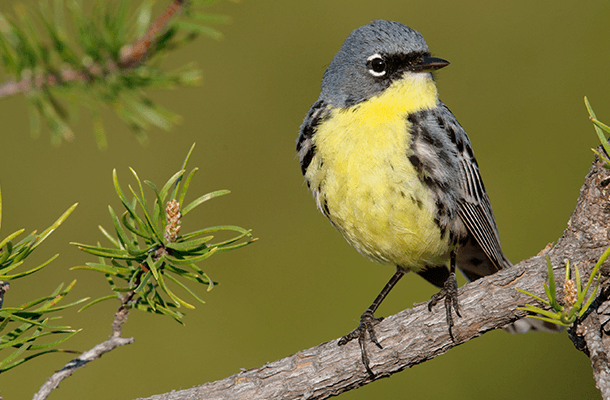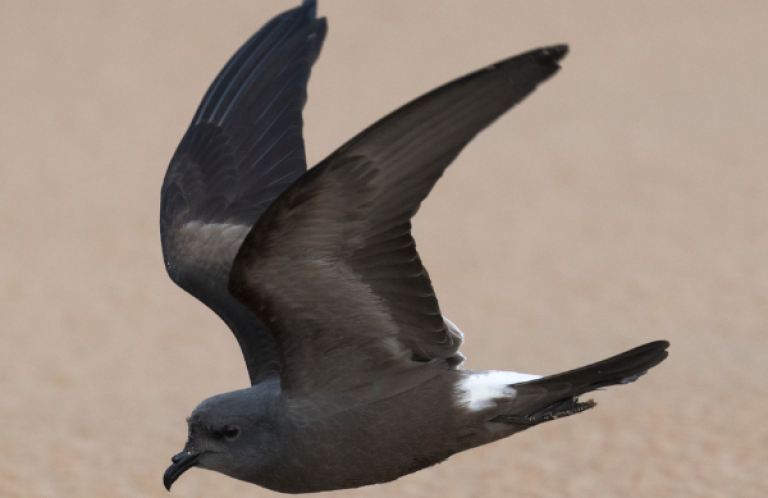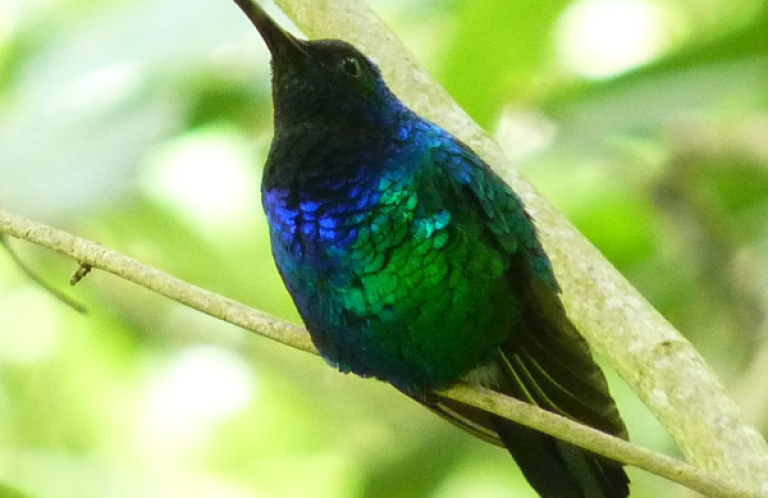Kirtland's Warbler is Off the List
Media Contact: Jordan Rutter, Director of Public Relations, 202-888-7472 | jerutter@abcbirds.org
Expert Contact: Shawn Graff, Vice President of ABC's Great Lakes Program, 262-707-5700 | sgraff@abcbirds.org

Thanks to extensive recovery efforts, Kirtland's Warbler populations have surged over the last 40 years, leading to the species' removal from the endangered species list on October 8, 2019. Photo by Jacob Spendelow
(Washington, D.C., October 8, 2019) Thanks to an intensive, decades-long effort from many partners in the wildlife conservation community, the Kirtland's Warbler is now an Endangered Species Act (ESA) success story, as its removal from the endangered species list was enacted today. The U.S. Fish and Wildlife Service (USFWS) announced the official delisting rule at a ceremony on the campus of Michigan State University in East Lansing, Mich.
“The delisting of the Kirtland's Warbler is cause for celebration and proof that the Endangered Species Act works,” said Shawn Graff, Vice President of American Bird Conservancy's (ABC's) Great Lakes program.
“But this warbler is still among the rarest, most range-restricted migratory songbirds in North America. It is conservation-reliant, meaning that continued management efforts are imperative for the population to hold its ground and continue to expand.”
The Kirtland's Warbler was among the first species listed when the ESA was enacted in 1967. At that time, the warbler was found only in a few isolated areas of Michigan's Lower Peninsula during the breeding season. During parts of the 1970s and 1980s, the Kirtland's Warbler population totaled fewer than 200 singing males before beginning its recovery.
The Kirtland's Warbler continues to do well in its historic stronghold while expanding its breeding range into areas of Michigan's Upper Peninsula, Wisconsin, and Canada. The species rebounded to include more than 2,300 breeding pairs by 2015. This progress doubled the original recovery goal set by USFWS.
American Bird Conservancy is playing a lead role to ensure needed conservation efforts for the Kirtland's Warbler continue after delisting. ABC has worked closely with a wide range of partners through the Kirtland's Warbler Conservation Team to develop a comprehensive business plan that addresses the warbler's needs across its life cycle, setting a course for post-ESA success.
ABC also has launched a long-term fund, raising private resources to maintain conservation support and meet emerging needs for the species in the future. The fund is being managed to generate sustainable revenue for important research, habitat development, and community outreach efforts throughout the species' range.
This revenue will complement continuing efforts of state and federal agencies to maintain the highly specific habitat the Kirtland's Warbler needs for breeding, and to limit impacts from Brown-headed Cowbirds, which contributed to its decline through brood parasitism. This private-public partnership represents a new model for addressing the ongoing needs of a delisted, conservation-reliant bird species.
These efforts were made possible thanks to major philanthropic support from the Harry A. and Margaret D. Towsley Foundation of Midland, Mich.
Another asset to ongoing Kirtland's Warbler conservation is Dr. David Ewert, ABC's Kirtland's Warbler Program Director, who is one of the leading researchers and conservationists focused on the species' recovery. Ewert has studied the species for nearly 20 years and currently leads ABC's efforts to support the Kirtland's Warbler on its non-breeding range in The Bahamas. He serves on the board of the Kirtland's Warbler Alliance and leads the Kirtland's Warbler Conservation Team's Non-breeding Range Subcommittee.
In 2018, ABC helped establish a full-time Avian Science Officer position in The Bahamas with a heavy focus on conserving Kirtland's Warblers during the non-breeding season. Working through the Bahamas National Trust, with funding provided via ABC by a private donor in Michigan, Bradley Watson has been pursuing specific priorities identified in the conservation management plans for the species' winter range. Watson's work includes population monitoring, habitat enhancements, and community engagement to support conservation. He also supports efforts to protect the Bahama Oriole, Bahama Nuthatch, and other rare, declining, and endemic bird species found in The Bahamas.
In addition to the Towsley Foundation's support, the Michigan Department of Natural Resources and the U.S. Forest Service are also pledging their commitment to continue habitat management and engage in partnerships that support the Kirtland's Warbler's population growth.
Concerned citizens and organizations can invest in the Kirtland's Warbler's ongoing recovery with a contribution to ABC's long-term fund by visiting abcbirds.org/donate/kirtlands.
###
American Bird Conservancy is a nonprofit organization dedicated to conserving birds and their habitats throughout the Americas. With an emphasis on achieving results and working in partnership, we take on the greatest problems facing birds today, innovating and building on rapid advancements in science to halt extinctions, protect habitats, eliminate threats, and build capacity for bird conservation. Find us on abcbirds.org, Facebook, Instagram, and Twitter (@ABCbirds).


















































